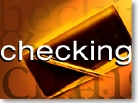|
Keeping tabs on bad checks
|
 |
October 2, 1998: 6:48 p.m. ET
Clues to help small business owners avoid getting stuck with a bounce
|
NEW YORK (CNNfn) - With 450 million checks bounced in the United States every year, U.S. business owners have to spend a lot of time trying to collect what they're owed. And the problem hits even harder for small business.
Fraudulent check-passers walk off with goods and services worth an estimated $850 million a year. Industry experts polled by the National Federation of Independent Business (NFIB) predict that bad-check losses will increase 25 percent a year in the foreseeable future.
Although intentional overdrafts and outright forgeries only make up a tiny fraction of all checks written - according to the American Bankers Association, only about one check in 60,000 is fraudulent - even one bad check can devour resources that a large company can absorb but a lower-volume business might find difficult to spare.
The time and expense of getting reimbursed for a bad check can be prohibitive.
After time has been spent in-house attempting to chase a check signer down and processing the account before turning it over to a professional collection agency, a small business can find that it's lost money on the transaction, especially after the collection agency takes its hefty percentage in payment.
However, short of refusing to accept payment by check, there's not much for the small business owner to do to ensure that he or she doesn't accept any rubber drafts.
According to debt collector organization the American Collectors Association (ACA), some tips for minimizing the risk include:
- Ask for photo identification, then compare the signature and photo on the ID to the person signing the check. More than half of all forged checks are cashed with an expired driver's license, so record the expiration date, license number and state on the front of the check just in case.
- If the printed address is a post office box, obtain a street address as well.
- Record cashier numbers and initials on the check. Initials are important if prosecution becomes unavoidable.
- Record all information legibly and accurately.
- Don't accept pre-written personal checks. At the very least, the writer should sign the check in your presence. This will also weigh into your benefit if court action becomes necessary.
- Don't accept starter checks or two-party checks.
Most importantly, the ACA said that the majority of forged checks have certain traits in common. The association warned small business owners to be leery if:
- The check does not have a perforated edge.
- The bank numbers across the bottom appear glossy or irregular.
- The last three digits of the Federal Reserve Number under the check number do not agree with the first three digits of the bank number at the bottom of the check
- There is a difference in the type styles, or they appear improperly aligned.
- The check bears a name other than the check writer's.
- The printing appears faint or photocopied.

|
|
|
|
|
 |

|

